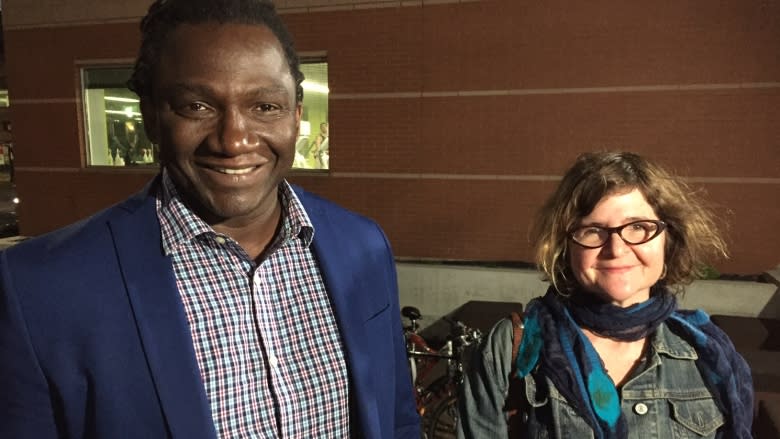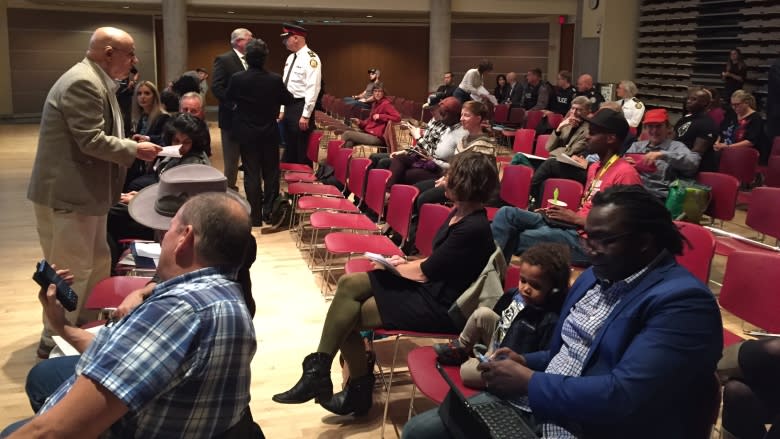Critics blast Toronto police's push for more Tasers, stress de-escalation
Advocates blasted Toronto police services board's push for greater deployment of Tasers, contending the exploration of less-lethal force tactics overshadows other recommendations aimed at helping police de-escalate tense situations.
Nigel Barriffe, president of Urban Alliance on Race Relations, attended Wednesday night's public meeting that renewed discussion around more front-line officers having access to conducted energy weapons, also known as Tasers, during tense and possibly deadly interactions.
Barriffe, who has long advocated for improved training for front-line officers who may encounter many different shades of mental illness on duty, claims the proposal isn't an effective way to reduce police violence.
He wants police to use their words instead of weapons.
"We've been saying to them — de-escalation, de-escalation, de-escalation — but yet they keep coming back with wanting to purchase millions of dollars of more violent weapons," he said.
"We know that having more weapons in the hands of police officers is not the answer."
'Officers want options'
Only front-line supervisors and some officers in specialized units carry Tasers, at this time. Toronto police have had Tasers, the only brand of CEW approved for use in Ontario, since 1999.
Tasers have long been described in police board reports as "effective tools that have prevented injuries to the public and police officers."
Under the renewed push, Toronto police is asking its civilian board to expand deployment to on-duty primary response unit constables and constables from designated specialized units.
Toronto police deputy chief Barbara McLean testified that officers don't want guns being the only weapons they have on hand.
"Officers want options because they want to ensure their safety as well as the safety of members of the public," she said, noting the weapon would never be used as a substitute for de-escalation.
Tasers would also be part of a suite of tools available to officers, she added. The board has also included outfitting police cars with non-lethal means of force, including shields and helmets in its review.
'Tasers are not safe'
But critics question the quality of research on these weapons — stressing that mental health can make the use of Tasers "more dangerous."
Peter Rosenthal, a prominent Toronto lawyer who has represented numerous families of people killed by police, told CBC Toronto he is not in favour of any Tasers.
In the last decade, according to data presented at the board meeting Wednesday, there have been no deaths recorded due to Taser use. Rosenthal says the review does not provide a full picture of the deaths and injuries associated with them.
"Everyone would like a safe alternative to a firearm, but it hasn't been invented yet," he said.
"Tasers are not safe and they're not an alternative to a firearm. They're not reliable enough to be used in circumstances in which a firearm would be justified. That's why officers are trained not to use them in those situations."
The province's police watchdog, the Special Investigations Unit, is still looking into the death of Rui Nabico, 31, who went into medical distress last Novemeber after he was Tasered by police. He later died in hospital.
"There's no question [Nabico] died after being Tasered by a Toronto police officer," Rosenthal previously told CBC Toronto.
'Tasers escalate the situation'
Critics made it clear at the consultation meeting they "don't trust police" because they say these are all-too-familiar scenarios at coroner's inquests in Ontario.
In the last decade, the coroner in 11 inquests has recommended full deployment of Tasers to all front-line officers, according to a Toronto police document released last week.
But as York University's chair of sociology Lesley Wood highlighted, all 18 coroner's inquests since 2005 have recommended de-escalation.
"Tasers are weapons and they're weapons that go away from the idea of zero death, zero harm which is the police's goal here," said Wood.
Tasers are more likely used on people with mental health issues and those in racialized communities, he added.
"What we've seen is when Tasers are adopted, often the number of deaths by the hands of police increase and it's because Tasers escalate the situation, rather than de-escalate the situation."
Board chair Andy Pringle said no decision would be made immediately and that expanding the deployment of the weapon is an "active discussion."



